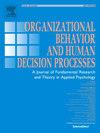When do people claim to know the unknowable? The impact of informational context on overclaiming
IF 3.8
2区 管理学
Q2 MANAGEMENT
Organizational Behavior and Human Decision Processes
Pub Date : 2025-01-01
DOI:10.1016/j.obhdp.2025.104390
引用次数: 0
Abstract
Managers and employees should not only identify what they know but also what they do not know. Yet, like other people, they often “overclaim” knowledge they cannot have, with myriad organizational consequences. Research has explored individual differences in such overclaiming. Herein, we propose that overclaiming is also contextually dependent on the informational environment. We find a robust assimilation effect of informational familiarity; people claim more knowledge of concepts that do not exist when they appear among familiar (versus unfamiliar) concepts (Studies 1–4). This effect is mediated by a self-inference process, whereby familiarity with real concepts leads people to infer they are knowledgeable on the topic, which in turn leads them to infer they also know nonexistent concepts ostensibly related to the topic (Studies 5–7). Our results suggest that informational context systematically affects the tendency to claim knowledge that one cannot have.
人们什么时候声称知道不可知的事情?信息语境对夸大的影响
管理人员和员工不仅要明确自己知道什么,还要明确自己不知道什么。然而,与其他人一样,他们经常会 "过度要求 "自己不可能拥有的知识,从而给组织带来无数后果。有研究探讨了过度获取知识的个体差异。在此,我们提出,过度获取知识也与信息环境有关。我们发现,信息熟悉度会产生强大的同化效应;当不存在的概念出现在人们熟悉(相对于不熟悉)的概念中时,人们会对这些概念提出更多的知识要求(研究 1-4)。这种效应是由自我推断过程介导的,即对真实概念的熟悉会使人们推断自己对该主题有一定的了解,这反过来又会使他们推断自己也知道表面上与该主题相关的不存在的概念(研究 5-7)。我们的研究结果表明,信息语境会系统地影响人们声称自己拥有不可能拥有的知识的倾向。
本文章由计算机程序翻译,如有差异,请以英文原文为准。
求助全文
约1分钟内获得全文
求助全文
来源期刊
CiteScore
8.90
自引率
4.30%
发文量
68
期刊介绍:
Organizational Behavior and Human Decision Processes publishes fundamental research in organizational behavior, organizational psychology, and human cognition, judgment, and decision-making. The journal features articles that present original empirical research, theory development, meta-analysis, and methodological advancements relevant to the substantive domains served by the journal. Topics covered by the journal include perception, cognition, judgment, attitudes, emotion, well-being, motivation, choice, and performance. We are interested in articles that investigate these topics as they pertain to individuals, dyads, groups, and other social collectives. For each topic, we place a premium on articles that make fundamental and substantial contributions to understanding psychological processes relevant to human attitudes, cognitions, and behavior in organizations. In order to be considered for publication in OBHDP a manuscript has to include the following: 1.Demonstrate an interesting behavioral/psychological phenomenon 2.Make a significant theoretical and empirical contribution to the existing literature 3.Identify and test the underlying psychological mechanism for the newly discovered behavioral/psychological phenomenon 4.Have practical implications in organizational context

 求助内容:
求助内容: 应助结果提醒方式:
应助结果提醒方式:


